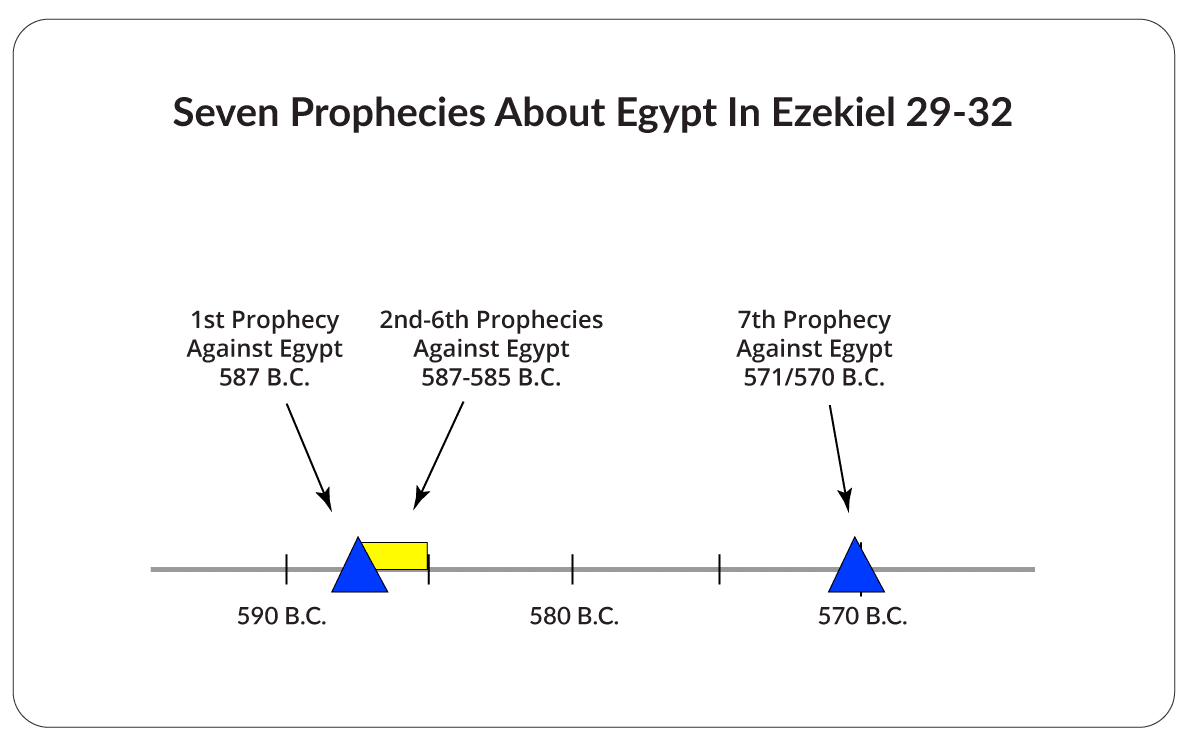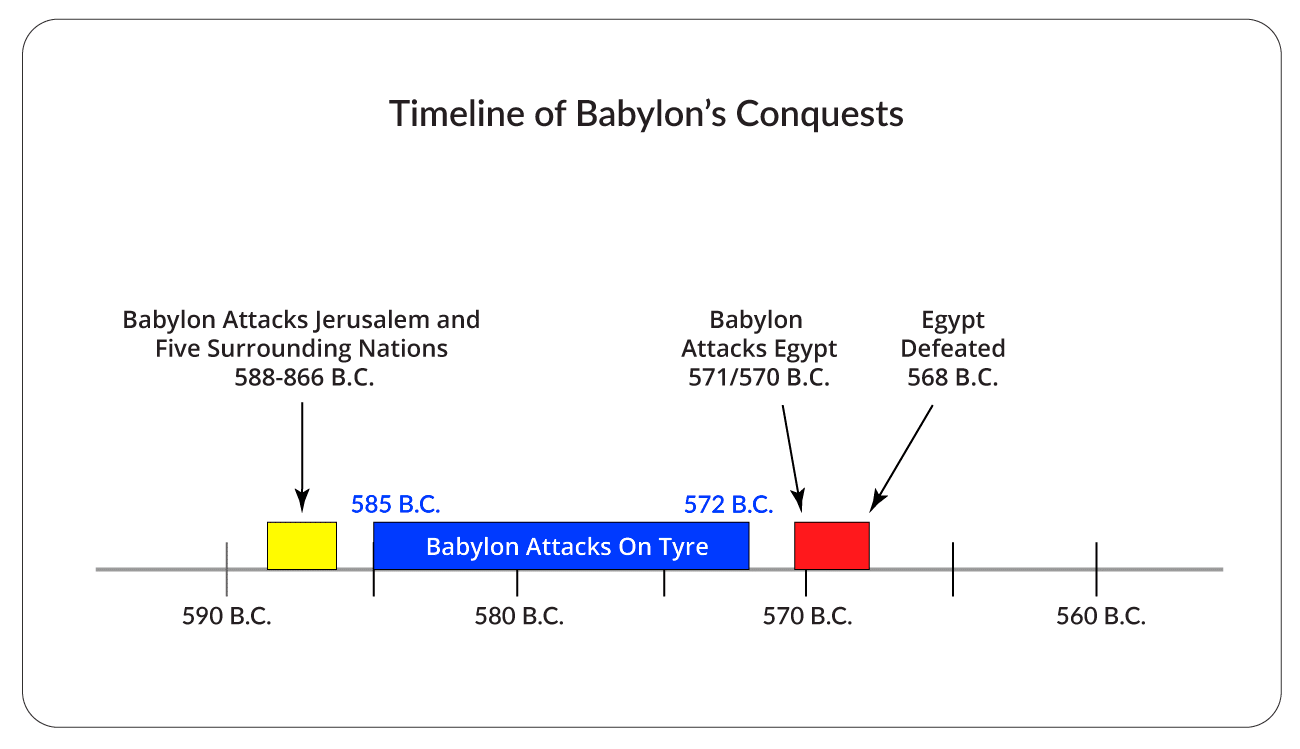
God Gives Egypt to King Nebuchadnezzar As a Reward
In our last study in Ezekiel 29, we discovered the first of seven prophecies that Yahweh gave against Egypt. In that study Yahweh announced that Egypt would be defeated by another nation that would make her desolate and a wasteland, scattering the people of Egypt for forty years. The prophecy said this would occur for two reasons. First, Egypt’s leader, Pharaoh Hophra, was proud. Second, the invasion and destruction of Egypt would occur because Egypt had promised to defend Israel against Nebuchadnezzar’s Babylonian army but did not keep its promise.
But the prophecy did not tell us which nation Yahweh would use to judge Egypt. However, the second prophecy will give us the answer. This second prophecy is recorded in Ezekiel 29:17-21. The remaining five prophecies are found in chapters 30-32. It is important to note that the first prophecy against Egypt was given in the year 587 B.C. The third, fourth, fifth, and sixth prophecies were given between the years 587 B.C. to 585 B.C. The last prophecy against Egypt was given in 571/570 B.C. So, the prophecies span a seventeen-year period.

Seven Prophecies About Egypt
Now you may wonder why I gave you the dates of these prophecies. The answer is that the last prophecy, the seventh one, does not appear in chronological order in the book of Ezekiel. It is not placed after the sixth prophecy which is given in Ezekiel 32. Instead, it was moved forward in the book of Ezekiel and placed right after the first prophecy. It is found in Ezekiel 29:17-21. Apparently, the prophet Ezekiel reordered the prophecy. It has been moved forward so that we can know which nation attacked Egypt and left it desolate, a wasteland, and scattered its people. This second prophecy is what our study is about today.
Date of the Second Prophecy
Ezekiel 29:17 is the first verse of this second prophecy. It gives us the date on which the prophet Ezekiel received this prophecy. We are told,
Now in the twenty-seventh year, in the first month, on the first of the month, the word of the LORD came to me saying . . . Ezekiel 29:17 (NASB)
The information given in this verse reveals the date of this prophecy is 571/570 B.C. It was given on New Year’s day in the Hebrew calendar since it says the “first month, on the first of the month.”

Timeline of the Babylonian Invasion of Egypt
Nebuchadnezzar Received No Spoils From Tyre
Verse 18 now reveals which king and which empire this second prophecy is about. The verse says,
“Son of man, Nebuchadnezzar king of Babylon made his army labor hard against Tyre; every head was made bald and every shoulder was rubbed bare. But he and his army had no wages from Tyre for the labor that he had performed against it.” Ezekiel 29:18 (NASB)
The message of this verse is King Nebuchadnezzar and his army had labored hard to defeat the city of Tyre. Eventually, Nebuchadnezzar quit after thirteen years. When he quit, he had “no wages from Tyre for the labor that he had performed against it.” This refers to the fact that King Nebuchadnezzar and his army had attacked the part of the city that was on the mainland for thirteen years[1] and had no spoils of war. He and his army had no reward.
In our study in chapter 26, we discovered that part of the city of Tyre was on the mainland and part of the city was on an island. The island was about 2,500 ft or one-half mile from the land. It was well-fortified with walls to the coastline. It was difficult for a navy or an army to attack Tyre. History indicates that King Nebuchadnezzar’s army initially attacked the portion of the city of Tyre that was on the mainland in 585 B.C., which was one year after the prophecy given in chapter 26. So, when King Nebuchadnezzar’s army attacked Tyre, he laid siege against the portion of the city on the mainland. That required the army to haul dirt, lumber, and debris from the surrounding area in order to build the dirt mounds so the soldiers could attack and climb over the city walls.
When we are told that the soldiers in King Nebuchadnezzar’s army would be bald and their shoulders would be rubbed bare, we should understand that the soldiers in the Babylonian army had worked long and hard to defeat the portion of the city on the mainland. Some people have suggested that when King Nebuchadnezzar finally defeated the city portion of Tyre, it was empty and the valuables of the city had been removed.[2] The thirteen-years of work did not provide any spoils of war. That would explain the meaning of the statement “he and his army had no wages from Tyre for the labor that he had performed against it.” That explains verse 18 of Ezekiel 29. I should add quickly that the island portion of the city was conquered later by Alexander the Great’s army about 332 B.C. That agrees with Ezekiel 26:13-14.
So, King Nebuchadnezzar attacked the portion of the city of Tyre on the mainland in 585 B.C. His army stopped the siege after thirteen-years in 571/570 B.C. They left without any spoils or very little.
Nebuchadnezzar Received Spoils From Egypt
But God rewarded King Nebuchadnezzar for his attack on Tyre. That is the message of 19-20.
Therefore thus says the Lord GOD, “Behold, I will give the land of Egypt to Nebuchadnezzar king of Babylon. And he will carry off her wealth and capture her spoil and seize her plunder; and it will be wages for his army. I have given him the land of Egypt for his labor which he performed, because they acted for Me,” declares the Lord GOD.” Ezekiel 29:19-20 (NASB)
In these two verses we are given four important facts. First, at the end of verse 20, we are told that King Nebuchadnezzar had acted for Yahweh. That is, it was Yahweh’s will that the king attack Egypt. So, the king attacked Judah and destroyed the temple and the city of Jerusalem. In addition, Yahweh wanted him to attack Ammon, Moab, Edom, Philistia, Tyre, and Sidon.
That is, Yahweh uses nations to punish other more evil nations. That is why Yahweh called the wicked, unbelieving King Nebuchadnezzar His servant (Jeremiah 25:9; 27:6; 43:10). That is, God uses the believing and unbelieving leaders of nations to accomplish His will. The same is true today of presidents, prime ministers, kings, and the leaders of all nations. So, Ezra 1:1 is a good example. In that verse we are told that Yahweh stirred up the spirit of Cyrus to send a proclamation throughout his kingdom that Jews could return to Jerusalem and rebuild the temple. God can and does change the hearts of leaders to accomplish His will. So, Nebuchadnezzar was His servant. The king “acted for” Yahweh.
Second, notice the middle of Ezekiel 29:20 tells us that King Nebuchadnezzar did just as Yahweh wanted. The king performed for the LORD.
Third, the first part of verse 19 says that Yahweh gave “the land of Egypt to Nebuchadnezzar king of Babylon. And he will carry off her wealth and capture her spoil and seize her plunder.” This reveals that Yahweh had decided Egypt would be destroyed and Nebuchadnezzar would do it.
Once again we are reminded of the biblical principle that all governing authorities of nations are in the control of our God. He controls who becomes the leader, when they become a leader, and for how long they will rule. This truth is so that His will is accomplished. So Yahweh appointed King Nebuchadnezzar to remove Pharaoh Hophra as the leader of Egypt and helped him to eventually rule over Egypt.
I would like to share with you a statement from an article titled, “New Light On Nebuchadnezzar’s Madness.” It was published by the International Journal For Pastors in April 1978. It says this about Nebuchadnezzar’s invasion of Egypt.
The prophets Jeremiah (43:10-13) and Ezekiel (29:19, 20) predicted such a campaign, but only a small fragment of a cuneiform tablet confirms that it occurred. The few broken lines of the fragment, owned by the British Museum, include information that in his “37th year [568/567 B.C.] Nebuchadnezzar, king of Babylon, marched against Egypt to deliver a battle. Amasis of Egypt called up his army.” Amasis was defeated, despite his large force of chariots and horsemen, and help of allies.[3]
That is, archaeological evidence that the prophecy was fulfilled.
The fourth important fact is found in the last part of verse 19. We are told the spoils from Egypt were wages for King Nebuchadnezzar’s army. What does that mean? Yahweh wanted to reward His servant Nebuchadnezzar. Now this is an amazing statement. Yahweh had used this king to accomplish His will against so many different evil nations. Yahweh planned to reward him “because he acted for Me.” That is, the king was rewarded by Yahweh for the quality of his work or for his faithfulness.
Now I want us to think about the goodness of God that has just been revealed to us. It is the primary principle from our study. Remember that God used King Nebuchadnezzar to punish Israel and all six nations around Israel that were proud and had despised or cursed Israel. King Nebuchadnezzar was very faithful but had trouble with Tyre. So, Yahweh rewarded the king and his army, even though Yahweh had accomplished everything through him. Augustine of Hippo captured the principle in this statement.
When God crowns our merits, it is nothing other than His own gifts that he crowns.[4]
He is correct. God calls us to serve Him. Next, He enables us to serve Him. Then He accomplishes the work. Finally, He rewards us for doing what He asked us to do and what He actually accomplished through us. The only way we can mess this up, is by being unfaithful, lazy, and committing sin. But we must not miss the point that God is good.
When we find nuggets of gold like this in Scripture, we should remember that Moses was up on Mount Sinai when the events of Exodus 33:12-23 occurred. On that occasion Moses asked God to reveal His ways but not His acts. Psalm 103:7 says that God did that. He showed Moses His ways, but the Israelites were only allowed to see Yahweh’s acts. The acts were what Yahweh did. We have seen what Yahweh for the unbelieving King Nebuchadnezzar and have just seen the acts of Yahweh.
So, what are God’s ways? His ways are the why or the reasons God did this for the king. The answer reveals God’s character. So, let’s discover one of God’s ways.
First, James 1:17 tells us every good gift comes from God.
Every good thing given and every perfect gift is from above, coming down from the Father of lights, with whom there is no variation or shifting shadow. James 1:17 (NASB)
Second, Romans 6:23 reveals the best gift God gives. Romans 6:23 says,
For the wages of sin is death, but the free gift of God is eternal life in Christ Jesus our Lord. Romans 6:23 (NASB)
The best gift God gives us is the free gift of eternal life to those who believe in Jesus Christ.
In Luke 11:11-13, Jesus compares God the Father to a father. He said,
“Now suppose one of you fathers is asked by his son for a fish; he will not give him a snake instead of a fish, will he? Or if he is asked for an egg, he will not give him a scorpion, will he? If you then, being evil, know how to give good gifts to your children, how much more will your heavenly Father give the Holy Spirit to those who ask Him?” Hebrews 11:6 (NASB)
Now that captures our principle for this study. Our God is not just good, He is incredibly good.
We must remember that Hebrews 11:6 promises this to everyone.
And without faith it is impossible to please Him, for he who comes to God must believe that He is and that He is a rewarder of those who seek Him. Hebrews 11:6 (NASB)
That is, if we seek Him, He will reward us for seeking Him. He will let us find eternal life. He will shower us with His grace (Romans 5:2). He rewards us.
1 Corinthians 3:6-7 tells believers that God has given each one of us a calling. Then when we perform our calling, it is God who brings success. This matches what God did for King Nebuchadnezzar.
I planted, Apollos watered, but God was causing the growth. So then neither the one who plants nor the one who waters is anything, but God who causes the growth. 1 Corinthians 3:6-7 (NASB)
Then in verses 11-14, the apostle Paul tells Christians that God gives us rewards which are based upon the quality of our work.
If any man’s work which he has built on it remains, he will receive a reward. 1 Corinthians 3:11-14 (NASB)
In addition, 1 Corinthians 4:5 states our reward depends upon our motives.
Therefore do not go on passing judgment before the time, but wait until the Lord comes who will both bring to light the things hidden in the darkness and disclose the motives of men’s hearts; and then each man’s praise will come to him from God. 1 Corinthians 4:5 (NASB)
Now I would like to share a story that will remind us why we do this.
A young man once studied violin under a world-renowned master. Eventually the time came for his first recital. Following each selection, despite the cheers of the crowd, the performer seemed dissatisfied. Even after the last number, with the shouts louder than ever, the talented violinist stood watching an old man in the balcony. Finally the elderly one smiled and nodded in approval. Immediately the young man relaxed and beamed with happiness. The applause of the crowd had meant nothing to him until he had first won the hearty approval of his famous teacher. So, too, the Christian must do all he does looking for God’s approval and in that be rewarded. Let the task be the reward.[5]
So, the principle is that because God is good, He rewards both unbelievers and believers for serving Him. Rewards are given in this life and for believers, we will also be given rewards in heaven.
Horn Sprouts From Israel
The final verse of this prophecy is verse 21.
“On that day I will make a horn sprout for the house of Israel, and I will open your mouth in their midst. Then they will know that I am the LORD.” Ezekiel 29:21 (NASB)
The key to understanding this verse depends upon how we understand the phrase “On this day” and “horn.” We will begin with the word “horn.” Since Israel is not an animal, the word “horn” must have a symbolic meaning. In a number of Old Testament passages the word “horn” symbolizes strength or power (1 Samuel 2:1; 2 Samuel 22:3; 1 Kings 22:11). The idea is that “on that day,” Yahweh will start the slow process of restoring Israel to power as a nation. It began when the Babylonian army defeated Egypt. The ultimate meaning of “on that day” appears to refer to the eventual restoration of the Davidic monarchy.
This seems to be the best understanding since the Babylonian army attacked Egypt in 570 B.C. In that year the Davidic monarchy did not return since Israel was still in captivity until 539 B.C. when the Medo-Persian Empire defeated the Babylonian Empire.
Also on that day, the prophet Ezekiel would be able to speak again. When that happened, the Israelites would know “that I am the LORD.” That is the fourth time that phrase has occurred in this chapter.
Conclusion
So, the principle for us to remember is that God is good to unbelievers and believers in this life. In Galatians 6:10, God tells us to do good to all men, especially those who are in the household of faith. God is our example. He is the ultimate example of goodness, including goodness to unbelievers and especially believers.
References:
1. Flavius Josephus. Antiquities of the Jews. Book 11, 1.
2. Ralph H. Alexander. Ezekiel. The Expositor’s Bible Commentary. Regency Reference Library. 1984. vol 6. pp. 8932-893.
3. New Light On Nebuchadnezzar’s Madness. International Journal For Pastors. April 1978. states, “The text translated by A. Leo Oppenheim is found in Ancient Near Eastern Texts Relating to the Old Testament, edited by J. B. Pritchard (Princeton, N.J.: Princeton University Press, 1950), p. 308. The words and letters put between brackets I ] have been supplied by the translator since they are broken off from the tablet.”
4. Mark Water. The New Encyclopedia of Christian Quotations. BakerBooks. 1984. p. 889.
5. Roy Zuk. The Speaker’s Quote Book. Kregel Publications. 1997. 329.
Suggested Links:
Book Studies - Explaining the Bible Verse-by-VerseBook of Ezekiel
Prophecy of Egypt’s Destruction and a Warning for Israel
Lament for Egypt and Her Allies For God Has Judged Them